- Home
- Marge Piercy
The Hunger Moon Page 6
The Hunger Moon Read online
Page 6
you are stealing from a woman her own ripe
sweet desire, the must of her fears,
the shadow she casts into her own future
and turning her into a diaper service,
the cleaning lady of your adventure.
Who thanks a lightbulb for giving light?
Listen, your mother is not your mother.
She is herself and unmothered. It is time
to take the apron off your mind.
Does the light fail us, or do we fail the light?
1.
My old cat lives under a chair.
Her long fur conceals the sharp
jut of her fleshless bones.
Her eyes are dimmed by clouds
of cataract, visible only
if you remember their willow green
as I could judge my mother’s
by calling up that fierce charred
brown gaze, smiting, searching.
When one of the young cats approaches
she growls in anger harmless
as distant thunder. They steal her food.
They do not act from malice.
They would curl up with her and wash.
She hisses fear. Her lifelong
companion died. They appeared.
Surely the young bear the blame
for all the changes that menace
in the fog of grey shapes looming.
Her senses that like new snow
had registered the brushstrokes
of tracks, the fall of a pine needle,
the alighting of a chickadee;
that tantalized her with message
of vole and shrew and rabbit,
boasting homage her lovers sprayed,
have failed her like an old
hanging bridge that decays
letting her drop through in terror
to the cold swift river beneath.
The light is trickling away.
2.
One day this week my father called
briefly emerging from the burrow
he bought himself lined with nurses.
He really wants to phone my mother.
Often he calls me by her name
but every time I fail him.
I am the dead woman in body,
hips and breasts and thighs,
elbows and chin and earlobes,
black black hair as at the age
she bore me, when he still
loved her, here she stands,
but when I open my mouth
it’s the wrong year and the world
bristles with women who make short
hard statements like men and don’t
apologize enough, who don’t cry
when he yells or makes a fist.
He tells me I have stolen his stamps
down in Florida, the bad utopia
where he must share a television.
You took my nail scissors, he shouts
but means I stole his vigor
deposited in his checkbook like a giant’s
external soul. I have his checkbook
and sign, power of attorney,
as I pay his doctors, doctors,
doctors, as I hunch with calculator
trying to balance accounts. We each
feel enslaved to the other’s will.
3.
Father, I don’t want your little pot
of nuggets secreted by bad living
hidden in the mattress of Merrill Lynch
in an account you haven’t touched
for twenty years, stocks that soared,
plummeted, doddering along now
in their own mad dinosaur race.
That stock is the doctor that Mother
couldn’t call when she had the first
stroke, the dress she didn’t get,
at eighty-six still scrubbing, cooking,
toting heavy laundry. The dentist
I couldn’t go to so I chewed
aspirin as my teeth broke
at fifteen when I went out to work.
The ghostly dust bowl roared in the mind
afterward, the desert of poverty
where you would surely perish and starve
if you did not hide away pennies of power,
make do, make do, hold hard,
build a fortress of petrified dollars
stuck together like papier-mâché
so the tempest of want
could be shut out to howl at others.
After she died, you bought Total Life Care,
a tower of middle-class comfort
where you could sit down to lunch
declaring, My broker says.
But nobody would listen. Only
Mother had to listen and she is dead.
You hid alone in your room fighting
with the cleaning woman who came
each week but didn’t do it right,
then finally one midnight wandered out
naked to the world among rustling
palms demanding someone make you lunch.
4.
You mutter, this was supposed to be fun.
Do you see your future in the bent
ones who whimper into their laps,
who glare at walls through which
the faces of the absent peer, who hear
conspiracy mutter in the plumbing?
I am the bad daughter who could speak
with my mother’s voice if I wanted,
because I wear her face, who ought
to be cooking your meals, who ought
to be running the vacuum you bought
her, but instead I pretend
I am married, pretend to be writing
books and giving speeches.
You won’t forgive her ever for dying
but I heard you call the night nurse
by her name. Grey blows in
the fog that took Mother while you slept,
the fog that thickens between you
and strangers here where all
is provided and nothing is wanted.
The sun blasts on, flat and blatant.
Everything was built yesterday
but you. Nobody here remembers
the strike when you walked the picket line
joking with sleet freezing your hair,
how you stood against the flaming wall
of steel and found the cracked bearing,
how you alone could make the old turbines
turn over, how you had the wife
other men watched when she swayed
over the grass at the company picnic,
how you could drink them all witless.
You’re a shadow swallowed by fog.
Through your eyes it enters your brain.
When it lifts you see only pastel
walls and then your anger standing there
gleaming like a four-hundred-horsepower car
you have lost your license to drive.
from
Available Light
Available light
Ripe and runny as perfect Brie, at this age
appetites mature rampant and allowed.
I am wet as a salt marsh under the flood tide
of the full solstice moon and dry as salt itself
that draws the superfluous juice from the tissues
to leave the desiccated butterfly wing intact.
I know myself as I know the four miles I walk
every morning, the sky like ice formed on skim
milk, the sky dappled and fat and rolling, never
the same two hours later. I know there are rooms
upon caverns opening off corridors I will never
enter, as well as those I’ll be thrust into.
I am six with my mother watching Clippers
take off for Lisbon. I am nine and the President
whose voice is a personal god is dying in
the radio.
I am twelve and coming while I mutter yes, yes,
of course, this is what the bones grow around to hold.
I am twenty-four as my best friend bleeds her life out.
At any moment I find myself under the water of my
past trying to breathe in that thick refracted medium.
At any moment a voice is speaking to me like a p.a.
system that one day amplifies a lecture on newts
and the next day jazz. I am always finding new
beings in me like otters swimming in the soup.
I have friends who gave themselves to Marx, to Freud,
to A.A., to Christianity or Buddhism or Goddess
religions, to the Party or the Lord or the Lover.
As a Jew, I have a god who returns me to myself
uncleaned, to be used again, since forgiveness must
be sung but changes not one needle falling from a pine.
As consequences show their lengthened teeth
from the receding gums, we hunger for the larger
picture, the longer view, and yet and yet
I cannot augment the natural curve of earth
except by including the moth and the mammoth,
the dark river percolating through the sea
built rock, the dense memories of shell
and sediment, the million deaths recorded
in each inch; the warm funky breath
of Leviathan as he breaches off the portside;
people in boots struggling to shove the pilot
whales free that a storm surge grounded.
In winter the light is red and short.
The sun hangs its wizened rosehip in the oaks.
By midafternoon night is folding in.
The ground is locked against us like a door.
Yet faces shine so the eyes stretch for them
and tracks in the snow are etched, calligraphy
I learn by rote and observation, patient
the way I am finally learning Hebrew
at fifty, forgiving my dead parents
who saw squinting by their own scanty light.
By four o’clock I must give up the woods,
come in, turn on every lamp to read.
Later when the moon has set I go out
and let the spears of Sirius and Rigel
pierce the ivory of my skull and enter
my blood like glowing isotopes of distance.
As I stand in the cold vault of the night
I see more and fainter stars as my eyes
clear or my blood cools. The barred owl
hoots. The skunk prances past me to stir
the compost pile with her sharp nails.
A lithe weasel flicks across the cul-de-sac.
Even the dead of winter: it seethes with more
than I can ever live to name and speak.
Joy Road and Livernois
My name was Pat. We used to read Poe in bed
till we heard blood dripping in the closet.
I fell in love with a woman who could ring
all bells of my bones tolling, jangling.
But she in her cape and her Caddy
had to shine in the eyes of the other pimps,
a man among monkeys, so she turned me on the streets
to strut my meek ass. To quiet my wailing
she taught me to slip the fire in my arm,
the white thunder rolling over till nothing
hurt but coming down. One day I didn’t.
I was fifteen. My face gleamed in the casket.
My name was Evie. We used to shoplift,
my giggling, wide-eyed questions, your fast hands;
we picked up boys together on the corners.
The cops busted me for stealing, milled me,
sent me up for prostitution because I weren’t
no virgin. I met my boyfriend in the courts.
Together we robbed a liquor store that wouldn’t
sell us whiskey. I liked to tote a gun.
It was the cleanest thing I ever held.
It was the only power I ever had.
I could look any creep straight on in the eyes.
A state trooper blew my face off in Marquette.
My name was Peggy. Across the street from the gas-
works, my mom raised nine kids. My brother-
in-law porked me while my sister gave birth
choking me with the pillow when I screamed.
I got used to it. My third boyfriend knocked me up.
Now I’ve been pregnant for twenty years,
always a belly bigger than me to push around
like an overloaded wheelbarrow ready to spill
on the blacktop. Now it’s my last one,
a tumor big as a baby when they found it.
When I look in the mirror I see my mom.
Remember how we braided each other’s hair,
mine red, yours black. Now I’m bald
as an egg and nearly boiled through.
I was Teresa. I used to carry a long clasp
knife I stole from my uncle. Running nights
through the twitching streets, I’d finger it.
It made me feel as mean as any man.
My boyfriend worked on cars until they flew.
All those hot nights riding around and around
when we had no place to go but back.
Those hot nights we raced out on the highway
faster faster till the blood fizzed in my throat
like shaken soda. It shot in an arc
when he hit the pole and I went out the windshield,
the knife I showed you how to use, still
on its leather thong between my breasts
where it didn’t save me from being cut in two.
I was Gladys. Like you, I stayed in school.
I did not lay down in backseats with boys.
I became a nurse, married, had three sons.
My ankles swelled. I worked the night hours
among the dying and accident cases. My husband
left me for a girl he met in a bar, left debts,
a five-year-old Chevy, a mortgage.
My oldest came home in a body bag. My youngest
ran off. The middle one drinks beer and watches
the soaps since the Kelsey-Hayes plant closed.
Then my boy began to call me from the alley.
Every night he was out there calling, Mama,
help me! It hurts, Mama! Take me home.
This is the locked ward and the drugs
eat out my head like busy worms.
With each of them I lay down, my twelve-
year-old scrawny tough body like weathered
wood pressed to their pain, and we taught
each other love and pleasure and ourselves.
We invented the places, the sounds, the smells,
the little names. At twelve I was violent
in love, a fiery rat, a whip snake,
a starving weasel, all teeth and speed
except for the sore fruit of my new breasts
pushing out. What did I learn? To value
my pleasure and how little the love of women
can shield against the acid city rain.
You surge among my many ghosts. I never think
I got out because I was smart, brave, hard-
working, attractive. Evie was brave.
Gladys and Teresa were smart. Peggy worked
sixteen hours. Pat gleamed like olivewood
polished to a burnish as if fire lived in wood.
I wriggled through an opening left just big enough
for one. There is no virtue in survival
only luck, and a streak of indifference
that I could take off and keep going.
I got out of those Detroit blocks where the air
eats stone and melts flesh, where jobs
dangle and you jum
p and jump. Where there are
more drugs than books, more ways to die
than ways to live, because I ran fast,
ran hard, and never stopped looking back.
It is not looking back that turned me
to salt, no, I taste my salt from the mines
under Detroit, the salt of our common juices.
Girls who lacked everything except trouble,
contempt and rough times, girls
used like urinals, you are the salt
keeps me from rotting as the years swell.
I am the fast train you are traveling in
to a world of a different color, and the love
we cupped so clumsily in our hands to catch
rages and drives onward, an engine of light.
Daughter of the African evolution
The beauty of the great predators amazes me,
the music of their sleek haunch muscles rippling,
the clear fierce gaze with the fire of hunger
dancing golden in those slitting pupils,
the way the hawk plays in the columns of air,
the snow leopard balances leaps with her heavy
tail among the rocks.
The grace of the fast grazers dazzles me,
the gazelle streaking whose hooves seem
to float over the ground, the stylish striping
of the zebra, a parade except against their
proper sun/shade pattern, the storm cloud
glory of horses, antelope’s skin of velvet dust,
the calm guilt-provoking gaze of ruminants.
But I am neither. I honor my mothers,
scuttling mammals hustling through the brush
who gobbled through life, a little of this,
a little of that, a lot of what others left,

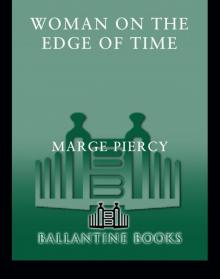 Woman on the Edge of Time
Woman on the Edge of Time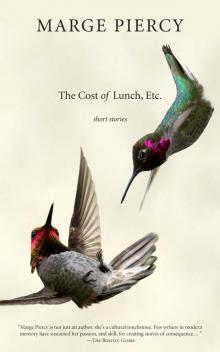 The Cost of Lunch, Etc.: Short Stories
The Cost of Lunch, Etc.: Short Stories Made in Detroit: Poems
Made in Detroit: Poems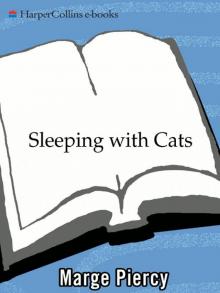 Sleeping With Cats
Sleeping With Cats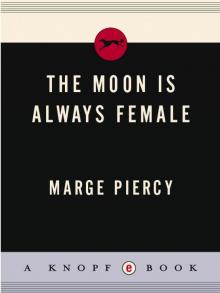 Moon Is Always Female
Moon Is Always Female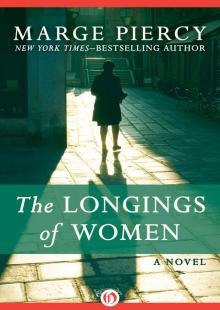 The Longings of Women
The Longings of Women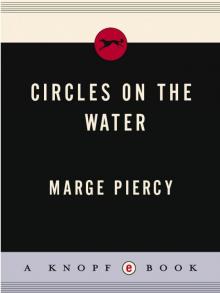 Circles on the Water
Circles on the Water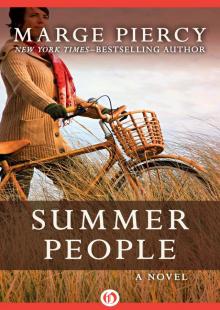 Summer People
Summer People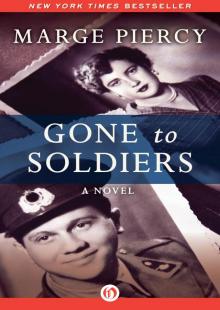 Gone to Soldiers: A Novel
Gone to Soldiers: A Novel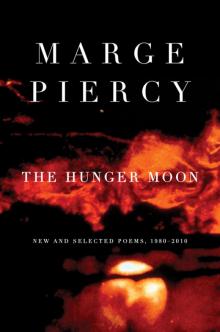 The Hunger Moon: New and Selected Poems, 1980-2010
The Hunger Moon: New and Selected Poems, 1980-2010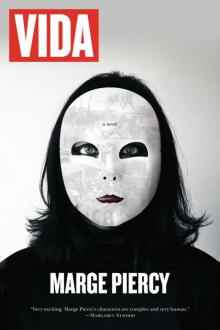 Vida
Vida Fly Away Home
Fly Away Home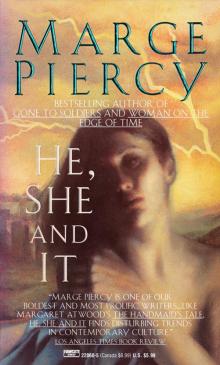 He, She and It
He, She and It So You Want to Write
So You Want to Write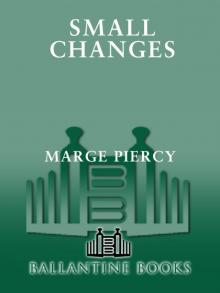 Small Changes
Small Changes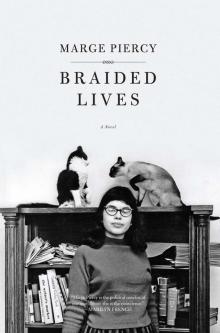 Braided Lives
Braided Lives Lord Valentine's Castle
Lord Valentine's Castle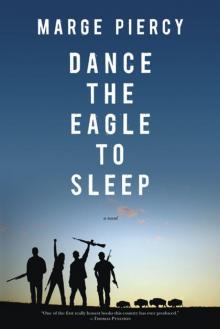 Dance the Eagle to Sleep
Dance the Eagle to Sleep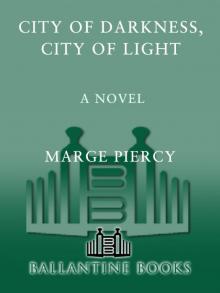 City of Darkness, City of Light
City of Darkness, City of Light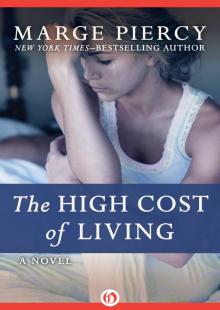 The High Cost of Living: A Novel
The High Cost of Living: A Novel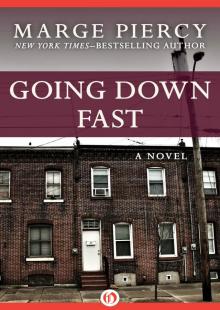 Going Down Fast: A Novel
Going Down Fast: A Novel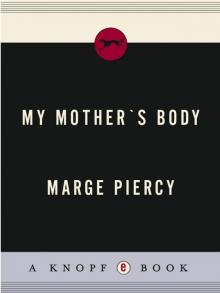 My Mother's Body
My Mother's Body Storm Tide
Storm Tide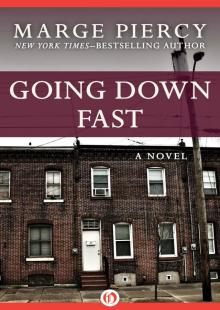 Going Down Fast
Going Down Fast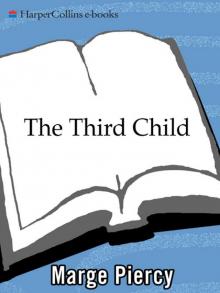 The Third Child
The Third Child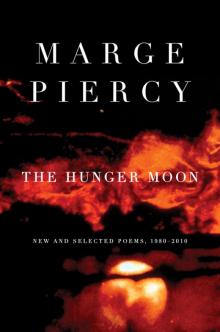 The Hunger Moon
The Hunger Moon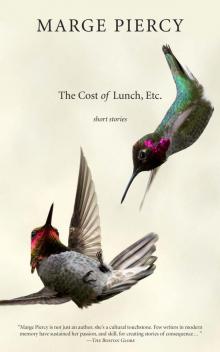 The Cost of Lunch, Etc.
The Cost of Lunch, Etc. Sex Wars
Sex Wars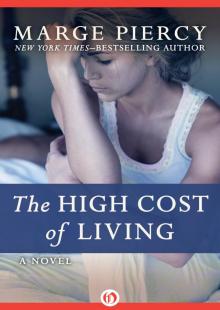 The High Cost of Living
The High Cost of Living Made in Detroit
Made in Detroit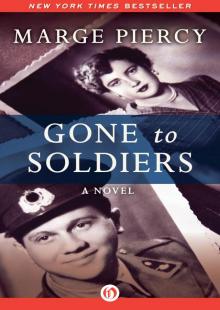 Gone to Soldiers
Gone to Soldiers